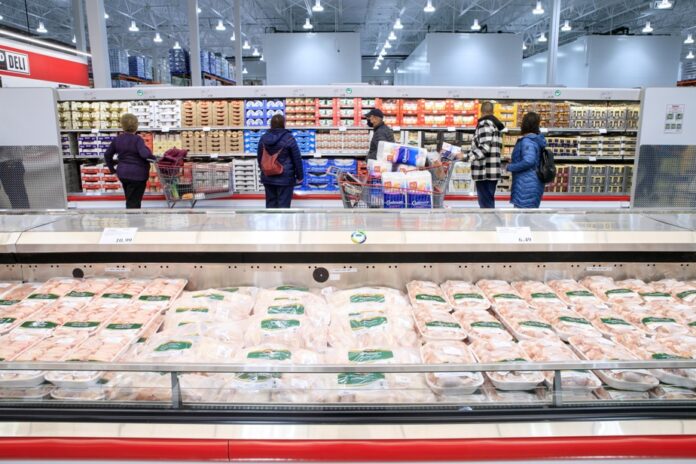(Toronto) Retail observers say that in the food sector, the presence in Canada of American giants such as Walmart and Costco is probably not responsible for the rise in prices in recent months.
Executives from Canadian grocery chains have asked MPs to interview these foreign retailers as part of their study on inflation at the House of Commons Standing Committee on Agriculture and Agri-Food (AGRI).
University of Toronto economist Ambarish Chandra says all retailers seek to maximize profits despite their stated efforts to minimize price increases. “It is easy to call foreign companies and have them explain why they are defrauding Canadian workers. It’s not like American grocers take advantage of Canadians and Canadian grocers don’t. Grocers are going to charge what they can afford, what the market will bear. »
In Canada, food prices continue to soar despite the overall decline in inflation in recent months. Grocery prices rose 10.6% in February from a year ago, while headline inflation was 5.2%.
Walmart Canada President and CEO Gonzalo Gebara told members of the parliamentary committee on Monday that his company was not trying to profit from food inflation. Instead, he insisted that it strives to maintain a price differential between its products and those sold by its competitors.
Walmart Canada’s gross margin rate for its food business and its total dollar operating profit declined last year, he said.
Gonzalo Gebara’s testimony follows a much-anticipated March 8 committee meeting in which executives from Metro and Empire, two of Canada’s three largest grocery chains, asked why MPs didn’t not appealed to US retail giants to answer their food inflation research questions.
The committee then unanimously agreed to invite the leaders of the Canadian branches of Walmart and Costco to speak. Pierre Riel, senior vice president and national director of Costco for Canada, is scheduled to appear before the committee on April 17.
Canadian grocers, including Loblaw Chairman and President Galen Weston, told the committee earlier this month that food inflation was not caused by the pursuit of profit, insisting that their markups on food had remained low.
But Ambarish Chandra responds to this remark: “ We have seen, frankly, bad behavior on the part of these grocers over the years, whether it is price fixing or other types of outrageous problems, such as the coordination of pay cuts for cashiers during the pandemic. All of these things stemmed from the fact that we just don’t have enough competition,” he said.
“We should seek to encourage competition, and one way to do that is to have more foreign grocers in the country. So Walmart’s presence is actually good for Canada in the long run, not bad. »
Simon Somogyi, an agribusiness researcher at the University of Guelph, adds that Walmart and Costco are larger companies than Canadian grocers, giving them the ability to source products in larger volumes, ultimately allowing them to sell at lower prices. “Their inclusion in our retail landscape is important and allows consumers to choose where they want to put their money. Typically, their motto is “come to us because we sell at a price that is generally lower than that of our competitors. ”
Simon Somogyi is of the opinion that “ any competition that can enter the market is welcome ” in order to reduce costs.
Factors such as high delivery, packaging and labor costs, as well as historically high commodity prices, are still contributing to rising grocery bills, but experts said ‘they expect food price increases to normalize by the end of 2023.
On the other hand, Professor Somogyi argues that if the ongoing parliamentary committee hearings result in increased transparency regarding the mechanisms that lead to increased costs for providers, they would benefit the public. “I was hoping to have a lot more discussion about how supplier prices are set,” he says.















